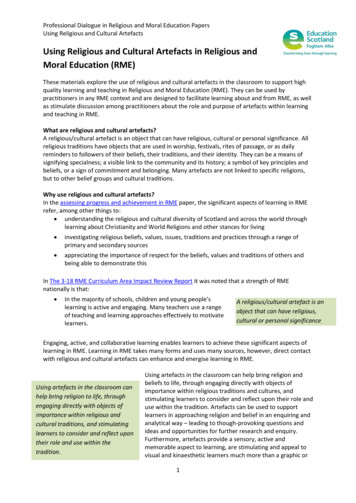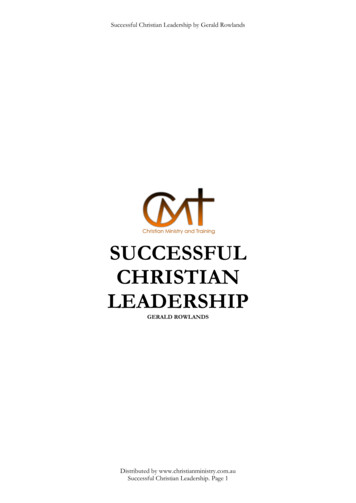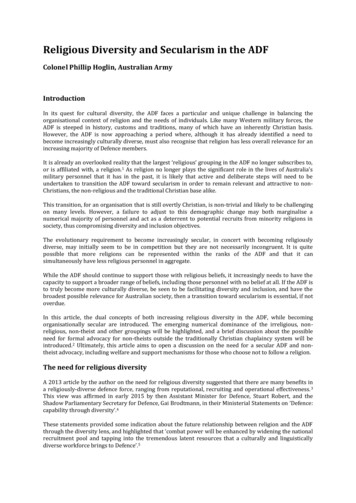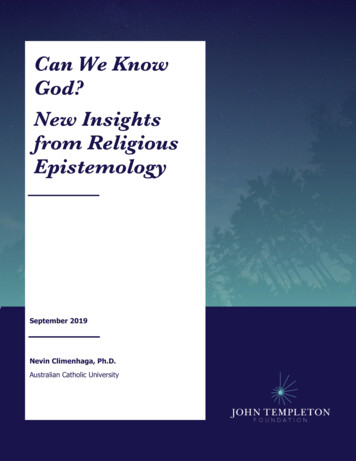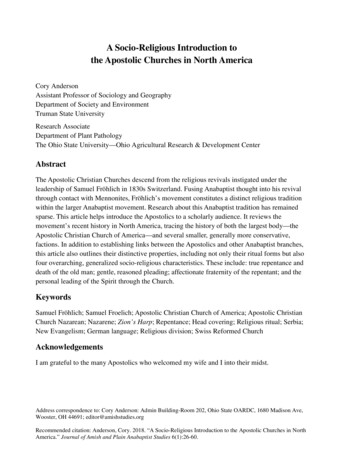
Transcription
Page 1 of 13Original ResearchCHRISTIAN RELIGIOUS LEADERSHIP AND THECHALLENGE OF SUSTAINABLE TRANSFORMATIONALDEVELOPMENT IN POST-MILITARY NIGERIA:TOWARDS A REAPPRAISAL 1Author:Dr. Obaji M. Agbiji1Prof. Ignatius Swart1Affiliation:1Research Institute forTheology and ReligionUniversity of South AfricaCorrespondence to:Dr. Obaji M. AgbijiEmail:obajiagbiji@gmail.comCorrespondence to:Prof. Ignatius SwartEmail:swarti1@unisa.ac.zaPostal address:PO Box 329 Pretoria, 0003,South AfricaThis article seeks to make an initial contribution towards a reappraisal of how the Christianreligious leadership in Nigeria is beginning to chart a new course in social transformation that hasthe potential to engender sustainable transformational development in the country. This aim ismet by first providing the necessary contextual orientation of how the two broad areas of politicalgovernance and economic development present themselves as prevailing major social challengesin present-day post-military Nigeria. This is followed by a discussion of the role of leadership asa primary causal and redeeming factor in meeting the challenge of sustainable transformationaldevelopment both in Nigeria and African society at large. The authors proceed then towards themain focus of the article, namely to move – on the basis of a literature and empirical exploration –towards a reappraisal of how the Christian religious leadership in present-day Nigeria is beginningto exert itself as an emerging movement for sustainable transformational development throughparticular institutional arrangements and modes of social engagement. This reappraisal leadsthe authors to end with a synthesising reflection on what they consider to be not only the mostoutstanding contribution to date by the Christian religious leadership in present-day Nigeria inadvancing a sustainable transformational development agenda, but also the crucial challengesthat this leadership still faces in meeting such an agenda.Keywords:Christian religious leadership, post-military Nigeria, sustainable transformationaldevelopment, leadership, African societies, political governance, economic development,Christian Association of Nigeria (CAN)Dates:Accepted: 01 Jun. 2015Published: 01 Sep. 2015How to cite this article:Agbiji, O. M. & Swart, I.,2015, ‘Christian religiousleadership and thechallenge of sustainabletransformationaldevelopment in postmilitary Nigeria: Towardsa reappraisal’ KOERS— Bulletin for ChristianScholarship 80(1), Art.#2212, 13 pages.Copyright: 2015. The Author(s).Published under theCreative CommonsAtribution License.Hierdie artikel poog om ‘n eerste bydrae te maak tot ‘n herwaardering van die wyse waaropdie Christelike godsdienstige leierskap in Nigerië besig is om ‘n nuwe weg te baan in sosialetransformasie wat die potensiaal het om volhoubare transformasionele ontwikkeling in dié landte bewerkstellig. Hierdie doelwit word bereik deur eerstens ‘n kontekstuele oriëntering te biedvan hoe die twee breë terreine van politieke staatsbestuur en ekonomiese ontwikkeling hulselfas heersende sosiale uitdagings in hedendaagse post-militêre Nigerië aanbied. Dit word gevolgdeur ‘n bespreking van leierskap as ‘n primêr oorsaaklike en bevrydende faktor in die realiseringvan volhoubare transformasionele ontwikkeling beide in Nigerië en die samelewing van Afrikain die breë. Hierna verskuif die bespreking na die sentrale fokus van die artikel, naamlik omop grond van ‘n literatuur- en empiriese ondersoek te beweeg na ‘n herwaardering van dieChristelike godsdienstige leierskap as ‘n ontluikende beweging vir volhoubare transformasioneleontwikkeling in hedendaagse Nigerië by wyse van spesifieke institusionele inrigtings en modussevan sosiale betrokkenheid. Hierdie herwaardering lei die skrywers daartoe om af te sluit met ‘nsamevattende refleksie nie slegs oor wat hul beskou as die mees uitstaande bydrae tot op hededeur die Christelike godsdienstige leierskap in hedendaagse Nigerië in die bevordering van ‘nvolhoubare transformasionele ontwikkelingsagenda nie, maar ook as die kritieke uitdagings watdié leierskap steeds in die gesig staar in die voltrekking van sodanige agenda.Sleutelwoorde:Christelike godsdienstige leierskap, post-militêre Nigerië, volhoubaretransformasionele leierskap, Afrika-samelewings, politiese oorsig, ekonomiese ontwikkeling,Christian Association of Nigeria (CAN)www.koersjournal.org.zadoi:10.4102/ koers.v80i1.2212
Page 2 of 13INTRODUCTIONThis article is presented as a sequel to our recent article (Agbiji& Swart 2013) on the formation of Christian leadership ideologyin Nigerian history and the implications and challenges thatit poses for positive social transformation in present-daypost-military or democratic Nigeria. The perspective that wedeveloped was profoundly critical as we argued that NigerianChristian leaders’ historic inability to contribute to positivesocial transformation in Nigerian society was to a great extentthe result of a negative leadership ideological orientation thathas shaped the mind-set of Nigerian religious and politicalleadership for centuries (Agbiji & Swart 2013). We thereforeconcluded as follows about the fundamental present-daychallenge that the Christian religious leadership, as part of theleadership at large, faces in attempting to convert itself into aforce for positive social transformation in present-day postmilitary Nigeria:Nigerian religious and political leaders should bereminded that they are not simply [spiritual or] politicalheads [respectively]: they are the divine symbols oftheir people’s health and wellbeing. Christian religiousleadership ideology should be re-orientated towards thewellbeing of the Nigerian populace, who find themselvesengulfed in poverty and deplorable living conditions.This should be seen as a sacred responsibility that shouldbe diligently carried out. As leaders, the office is the linkbetween human rule and spiritual rule. Christian religiousleaders should re-orientate their leadership ideology andpractice based on the conviction that their prophetic voiceand engagement are both a social and spiritual contractfor which they are accountable to God and to the people ofGod (Agbiji & Swart 2013:244).This article continues where we left the discussion in thatarticle by focusing more pointedly on the presence of Nigeria’sChristian religious leadership in the present post-militarydispensation and the question of its potential and actualcontribution as a transformational force. Without divertingfrom our critical thesis about the negative trends in the historyof Christian religious leadership formation in Nigerian society(see Agbiji & Swart 2013:221-244), in this article we argue thatthere may yet be some scope today to start reappraising therole and place of Christian religious leaders in the presentNigerian dispensation. Thus, whilst we maintain our positionthat considerable scope remains for a re-orientation of the waythat Nigerian Christian religious leaders perceive and exertthemselves as servants of positive social transformation (Agbiji& Swart 2013:243-244), we at the same time find legitimategrounds on the basis of our on-going research to move towardsa tentative, cautious and not uncritical reappraisal of our initialargument. Although still of an emergent nature, we proclaimthat there is some evidence of a shift in Christian religiousleadership that has the potential to contribute meaningfullytowards our preferred notion of social transformation in thisarticle: sustainable transformational development in presentday Nigerian society.In our present discussion, Christian religious leadership referswww.koersjournal.org.zaOriginal Researchto Christian clergy and other Christian leaders who occupyleadership positions in denominational and ecumenical churchsettings but are non-clergy. Sustainable transformationaldevelopment, in turn, is defined as processes of profound anddurable positive change in the spiritual, psychological, moral,social, economic, political, institutional, environmental andtechnological spheres (Agbiji 2012:290). Against this backdrop,this article seeks to make an initial contribution towards areappraisal of how the Christian religious leadership in Nigeriais beginning to chart a new course in social transformation thathas the potential to engender sustainable transformationaldevelopment in the country. To meet our aim, we will providethe necessary contextual orientation by giving a brief accountof how the two broad areas of political governance andeconomic development present themselves as prevailing majorsocial challenges in present-day post-military Nigeria. Thiswill be followed by a discussion of the role of leadership as aprimary causal and redeeming factor in achieving sustainabletransformational development both in Nigeria and Africansociety at large, after which we will move – on the basis ofa recent literature and empirical exploration – towards ourreappraisal of how the Christian religious leadership inpresent-day Nigeria is beginning to exert itself as an emergingmovement for sustainable transformational developmentthrough particular institutional arrangements and modes ofsocial engagement. Finally, we will end our discussion witha synthesising reflection on what we consider to be not onlythe most outstanding contribution to date by the Christianreligious leadership in present-day Nigeria in advancing asustainable transformational development agenda, but alsothe crucial challenges that this leadership still faces in meetingsuch an agenda.PREVAILING POLITICAL AND ECONOMICCHALLENGES IN POST-MILITARY NIGERIAIn this section the ongoing challenge of sustainabletransformational development in present-day Nigerian societyis discussed by specifically taking account of two broad areas:political governance and economic development. The mainfocus here is to critically but briefly state the ongoing challengesthat impede the attainment of sustainable transformationaldevelopment in Nigeria. We reiterate that sustainabletransformational development is understood in this articleas the process of profound and durable positive change in thespiritual, psychological, moral, social, economic, political,institutional, environmental and technological spheres ofthe Nigerian society. In evaluating the impediments to theattainment of sustainable transformational development,attention will particularly be focused on the Obasanjo andYar’adua administrations, which effectively marked thebeginning of the post-military or democratic era.2.1Political governanceThe political governance of Nigeria that commenced on 29 May1999 under the leadership of President Olusegun Obasanjointroduced the beginning of a new era in the political historyof this country. This new era is termed the ‘post-military’or ‘democratic’ era. Political governance occupies a centraldoi:10.4102/ koers.v80i1.2212
Page 3 of 13position in the Nigerian development discourse, both inthe national and the international arenas. The concept ofgovernance refers to the use of political power to manage anation’s public affairs and to shape its economic and socialenvironment in line with perceived notions of public interestand societal progress (Nkom 2000:75). Based on Steve Nkom’sdefinition of governance, good governance could thereforeimply the use of political power by political leaders to managethe affairs of a nation effectively and to shape the economicand social environment in the interests of and to advance theprogress of the entire nation. Ejeviome Otobo (2004:101-121), inturn, has pointed to the importance of political governance inthe development agendas of both Nigeria and Africa as a whole.According to Otobo, three facts underscore the importance ofpolitical governance. Firstly, poor governance of states is a keyhindrance to economic reform and growth. Secondly, with thepersistent failure of development policies in Nigeria and subSaharan Africa, economists and development practitioners areviewing ineffective governance as contributing to such failures.Thirdly, political governance defines the context in which theother two major forms of governance – economic and corporategovernance – are practised (Otobo 2004:101).Scholars argue that despite some achievements by politicalleaders in post-military Nigeria, major deficiencies in certainkey areas remain. This notably pertains to the inconsistenciesin electrical power generation and supply, the Niger Delta oilexploitation crisis, the sporadic and lacklustre crackdownson corruption, election rigging and Islamic militancy. At thesame time, the dismal state of the manufacturing sector, thedeplorable state of public schools, hospitals and roads and thehuge unemployment indices could be identified as furtherworrisome aspects that do not reflect well on the eight yearsof Obasanjo’s democratic rule and sadly endured under theleadership of Umaru Musa Yar’Adua, Obasanjo’s successor(Eneh 2011:34; Marcellus 2009:205-206; Power 2008:69).In judging President Yar’Adua’s attempt to eradicate poverty andunderdevelopment, the Nigerian newspaper Financial Standardreported in 2009 that the Poverty Eradication Council (PEC)that he headed could not achieve anything tangible towards thealleviation of poverty in Nigeria (Financial Standard 2009:6).Jonathan Power (2008:69) and Onyedika Agbedo (2010:12)likewise attributed the failure of Yar’Adua’s poverty-alleviationinitiatives to corrupt leadership and financial institutions suchas banks, whose leaders were involved in shady financial dealsinvolving money laundering and the embezzlement of publicfunds deposited in their banks. We may conclude, then, thatfrom Obasanjo’s leadership (1999-2006) to that of Yar’Adua(2007-2010), Nigeria’s political leadership by and large failedto make adequate use of their political power to initiate goodleadership and policies that would have contributed towardsthe attainment of sustainable transformational development.2.2Economic developmentOriginal Researcheconomy include transnational corporations (TNCs) such asShell, Chevron, Coca Cola, Toyota, May and Baker, and Unilever.The challenge inherent in an economy that is neo-colonialcapitalist is that such an economy is in the hands of powerfulforeign companies and their agents, and the usual practiceis that those resources that are generated in the process ofproduction are usually exported by those foreign ownersto their home countries for the benefit of reinvestment anddevelopment (Onyekpe 2004:135-136).The Nigerian economy is dependent in the sense that thelevel of production is often influenced by the dynamics andbehaviour of the metropolitan economies, structured to supplythese metropolitan economies with raw materials at very lowprices and to serve as a market for their industrial manufactures(Onyekpe 2004:135; Shao 2001:23). Among the major economicdevelopment programmes worth mentioning in the postmilitary era is the National Economic Empowerment andDevelopment Strategy (NEEDS). NEEDS was a ‘home-grown’poverty-reduction, medium-term strategy derived from thecountry’s long-term goal to reduce poverty and generate wealthand employment. It focused on four key strategies: reformingthe way government and its institutions work; growing theprivate sector; implementing a social charter for the people;and re-orienting the people towards an enduring African valuesystem (Nwokoma & Nwokoma 2010:102; Marcellus 2009:203205).The score card, when assessing NEEDS, which represented oneof the most strategic economic development programmes inNigeria from 1999 to 2010, is not encouraging. Commentingfurther on NEEDS and the policies that came into existence inthe wake of its implementation, scholars conclude that quitea number of its objectives and anticipated reforms such asprofessionalism and enhanced efficiency in service deliverywere hardly achieved. The immediate outcome of the reformsin most of the sectors was retrenchment of the workforce.As a result of the implementation of NEEDS, the schemesucceeded in creating more unemployment than the number ofunemployed it set out to reduce. The total dilapidation of basicinfrastructure and policy inconsistencies further worsenedthe employment situation in the labour-abundant Nigerianeconomy (Nwokoma & Nwokoma 2010:110-111; Marcellus2009:206; Oni 2005:6, 9).We may well maintain that although political and economicinstitutions in contemporary Nigeria have made attempts totransform the Nigerian socio-political and economic contexts,sadly, profound and durable positive change in the spiritual,psychological, moral, social, economic, political, institutional,environmental and technological spheres of the Nigeriansociety remain elusive. It has therefore become pertinent toexplore the crucial role of leadership as both a causal andredeeming factor in social transformation.The causal and redeeming factor of leadershipThe post-military or democratic Nigerian economy is basicallyneo-colonial capitalist, dependent and largely dominated byprimary or extractive production. It may be regarded as neocolonial capitalist because the major investors in the Nigerianwww.koersjournal.org.zaWhilst the actions and inactions of socio-political, economicand religious leadership may have contributed considerably tothe on-going social challenges in African societies, leadershipdoi:10.4102/ koers.v80i1.2212
Page 4 of 13in all facets of the same societies should nevertheless beseen as a major means through which these societies can betransformed (Belshaw et al. 2001:3-6; Wolfensohn & Carey2001:vii). For lack of space this section will not address thedifferent theoretical concepts of intellectual, political, state andreligious leadership and their differences and interrelatedness.The focus here is to address the importance of leadership in thesocial transformation of African societies. We maintain thatwhereas there exist demarcations in academic discourses onintellectual, socio-political, economic and religious leadershipin social transformation in European and North Americancontexts (Zuidervaart 2013:246), in Africa in general andNigeria in particular, these delineations do not exist in the dailyoperation of society (Mbiti 1999:177).Nigerians, like other Africans, view life holistically and, assuch, the socio-political, intellectual, economic and religiousdimensions of life are intertwined (Kunhiyop 2008:226). In thesame vein, the influences of leadership from socio-political,economic and religious spheres inform each other bothpositively and negatively (Agbiji & Swart 2013). It is for thesereasons that leadership from these quarters is inevitable in theachievement of social transformation. In this regard, the focusnow falls on both the causal and redeeming roles of leadershipwithin the African and Nigerian contexts as a foundation fordeeper consideration and exploration.3.1The African perspectiveThe attainment of political independence for African countrieshas been credited to African intellectuals and leaders in theirrespective countries, including, inter alia, Nnamdi Azikiwe(Nigeria), Kwame Nkrumah (Ghana), Julius Nyerere (Tanzania),Leopold Senghor (Senegal) and Nelson Mandela (SouthAfrica). The efforts of these leaders have had a major positiveimpact not only on their own countries but, to a large extent,have also influenced the entire African continent (Agbiji2012:41). Although the hope of the masses that their politicalindependence would translate into economic independenceis still far from being realised, Lual Deng (1998:141-146)has argued that this was not the fault of the generation ofintellectuals and leaders who had fought for independencebut rather that of the following generation. Deng emphasisesthat it is essential that the attainment of African development– a second independence – be the prerogative of contemporaryAfrican intellectuals, researchers, policy analysts and othertypes of leaders.According to Deng, the state is the hub of sustainabledevelopment on which the other key elements such asagriculturally-led economic growth, social stability andecological harmony all depend. In view of the key role thatthe state plays in most African countries, including Nigeria, itwould therefore be impossible to side-line political leadership,as a prominent representation of the state, from developmentinitiatives, if any meaningful development progress is ever tobe achieved (Deng 1998:235). Unfortunately, however, it needsto be re-emphasised at this point that poor leadership in Africahas repeatedly dashed the hopes of the masses.www.koersjournal.org.zaOriginal ResearchOladele Omosegbon, focusing on the importance of economicintelligence, has remarked on the need for objectivity on the partof African intellectuals and advisers (leaders) in their choice ofan economic path for their countries. Although he supports theacceleration of Africa’s development through diversification,he maintains that challenging issues such as corruption, civilstrife and bad governance recurrent factors in African nationssuch as Nigeria, Kenya, Zimbabwe, Zambia, South Africaand many others should be taken into consideration. In hisopinion, African nations would do better by forming strongcollaborative relationships between themselves than followingthe current trend of collaborating with the powerful nations ofthe Northern hemisphere (Omosegbon 2010:55). Scholars arguethat leadership is key to the social transformation of Africannations including Nigeria, and seldom in African history hasthoughtful, credible leadership been more needed in the socialtransformation of African societies than it is needed today(Gumede 2014:1; Shao 2001:24). The point being stressed hereis the pertinent role of leadership in the profound processesthat are required for the social transformation of contemporaryAfrican societies.3.2Nigerian perspectiveWhereas the important role of an unjust global economic orderand other contributory factors to the problem of poverty andunderdevelopment in Nigeria should not be underestimated,poor leadership should by and large be held responsible for thelack of sustainable transformational development in Nigeria.Chinua Achebe (1983:1) once asserted that the problem withNigeria is simply a failure of leadership. Affirming Achebe’sview on Nigerian leadership, Dele Seteolu (2004:74) hasargued that the Nigerian state is governed by a predatorypolitical class that has given rise to political corruption andunderdevelopment. In the same vein, Ozoemenam Mbachu(1997:57-58) asserted that the malaise of poor leadership isnot a new development in Nigeria but a challenge that hascontinued to live on, unconquered and disheartening. Suchpoor leadership has displayed incompetence and selfishness,and shown itself as incapable of satisfying the yearnings andaspirations of Nigerians. Unfortunately, because leadership hasmuch to do with influence, the prevailing type of leadershiptends to be replicated in its followers. In support of this position,Achebe (1983:10) noted that Nigerians are unavoidably whatthey are because their leaders are not what they should be.Mbachu (1997:59) agrees that whatever forms of behaviour theleaders engage in often tend to be reflected in the behaviourof the followers. This may seem like an over-exaggeratedcomment on leadership, but it is difficult to contest. Mbachufurther substantiates his position by arguing that every society,whether authoritarian, dictatorial or democratic, needscommitted leaders for its well-being.The centrality of leadership in any society has long beenestablished in political theory, which argues that society isdivided into a few who have power (leaders) and the manywho do not (followers) (Mbachu 1997:58-59). A leader has thecapacity to navigate between the good and the just and betweenwisdom and consent. At the same time he/she should alsobe able to be flexible and principled (Lanre-Abass 2008:117).doi:10.4102/ koers.v80i1.2212
Page 5 of 13Leaders innovate, focus on people, develop and inspire trust,have a long-term perspective, show originality and challenge thestatus quo. Leaders guide, direct, motivate, influence, and makechoices that enable their followers to contribute to the successor positive transformation of the entity they lead (Ukaegbu2007:162). Sustainable transformational development isabout processes of profound and durable positive change inthe spiritual, psychological, moral, social, economic, political,institutional, environmental and technological spheres of theNigerian society. Accordingly, the inability of Nigerian leadersto initiate and sustain profound changes in these spheres largelyaccounts for the elusiveness of sustainable transformationaldevelopment in Nigeria (Egharevba & Chiazor 2012:2; Olowu2011:68; Agba 2010:16).It is thus not an overstatement to argue that leadershipis a core issue in Nigerian development as in many otherAfrican countries. Accordingly, it is our argument thatChristian religious leadership likewise has a responsibilityto rise to the challenge of addressing the scarcity of credibleleadership in Nigeria so as to be able to engender sustainabletransformational development. Most of the leaders in Nigeriaidentify with both the church and with other religious entities.Nigeria, for example, boasts a large Christian population whichis engaged on a daily basis at different levels in Nigerian society(Olowu 2011:75; Oladipo 2001:222). This implies that a wellmobilised Christian fold with the desirable leadership anddevelopment ideology could effectively contribute towardsthe socio-economic and political transformation of the nation.The challenges of development in Nigeria persist and requiredeeply grounded solutions.4Elements of a reappraisal: Christianreligious leadership engagement in postmilitary Nigerian societyWith the discussion so far providing important background, wenow turn our attention in this section and in the next to what wehave indicated in the introduction is our main objective in thisarticle: to move, on the basis of a recent literature and empiricalexploration, towards a reappraisal of how the Christian religiousleadership (Christian clergy and other Christian leaders whooccupy leadership positions in denominational and ecumenicalchurch settings but are non-clergy) is beginning to exert itselfas a force for sustainable transformational development inpresent-day Nigerian society – i.e. most specifically in the postmilitary or democratic era.4.1Establishment of the ChristianAssociation of Nigeria (CAN)In terms of a relevant historical orientation, we may wellremind ourselves of the role of Christian missionaries fromthe inception of Christianity in Nigeria in fostering a particularChristian influence and leadership. Their efforts were carriedout mainly within the ambit of welfare and social services (Agbiji2012:115-117), although this also extended to the establishmentof institutions such as schools, hospitals, courts and publishingfacilities (Aye 1987:168-170). Furthermore, many of themissionaries worked closely with the colonial administrationwww.koersjournal.org.zaOriginal Researchand, in some instances, some of them played dual roles bothas missionaries and administrators (see Proctor 2000:4561). Unfortunately emergent indigenous Christian religiousleadership was neither enabled nor encouraged to follow suitbecause of the missionaries’ disinclination to engage with thelocals on ‘secular issues’ (Musa 2009:27-28; Aye 1996:1-27).Against this background, a significant development on the wayto a socially and politically more engaged indigenous NigerianChristian religious leadership took place when church leadersagreed on 27 August 1976 to form the Christian Association ofNigeria (CAN) (CAN 2010:1).The formation of CAN, the largest ecumenical body in Nigeriaand Africa (CAN 2010:1), significantly marked the unfoldingof what has today undoubtedly become the ‘most powerfulChristian voice in Nigeria’ (Mbachirin 2004:655). Despite thefact that the various church denominations in Nigeria engagein social issues in a variety of ways through their leaders andstructures, CAN and its constituent blocs have become themost viable platform through which Christian religious leadersaddress social issues in Nigeria. The constituents of CANreflect a conglomeration of groups inclusive of all the variousdenominations in Nigeria, from the national to the local level.These groups of churches that constitute CAN are also called‘blocs of CAN’. They include the Catholic Secretariat of Nigeria(CSN), Christian Council of Nigeria (CCN), Christian PentecostalFellowship of Nigeria and Pentecostal Fellowship of Nigeria(CPFN/PFN), Organisation of African Instituted Churches(OAIC), and Tarrarya Ekkelisiyar Kristi a Nigeria and EvangelicalChurch of West Africa (TEKAN/ECWA) (CAN 2010:4).In collaboration with CAN and its constituent bodies, Nigerianchurch leaders are now engaging in Nigerian social discourseand activities through organisations such as the Nigerian InterReligious Council (NIREC), African Forum on Religion andGovernment (AFREG), Forum for Righteousness in Governance(FRIG), Congress on Christian Ethics in Nigeria (COCEN) andSave Nigeria Group (SNG). In addition, Christian religiousleaders under the auspices of CAN are today collaborating withgovernment to alleviate poverty and fight corruption. Whilst theengagement of church leaders with NIREC effectively representsthe component of inter-religious dialogue, their involvementswith AFREG, FRIG, COCEN and SNG relate to their advocacyand collaborative initiatives with government and civil society.In our view, it is these modes of social engagement on the partof the Christian religious leadership that now portrays it as aforce for the initiation and sustenance of processes of profounddurable changes in the spiritual, moral, psychological, sociopolitical and economic spheres of society herein referred toas sustainable transformational development. In the sectionsthat follow these engagements are
leadership that has the potential to contribute meaningfully towards our preferred notion of social transformation in this article: sustainable transformational development in present-day Nigerian society. In our present discussion, Christian religious leadership refers to Christian clergy and other Christian leaders who occupy



